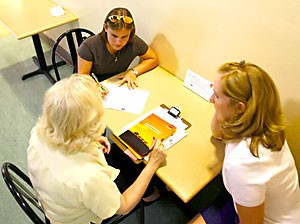As many college students leave the nest for the first time in their lives, new responsibilities arise that didn’t exist before, such as money management.
Luckily for those new to paying bills and prioritizing (Which is more important to spend money on – food or beer?), the UA provides many resources specifically for managing finances.
The Office of Student Financial Aid not only processes the paperwork for student financial aid, but they also provide one-on-one counseling for students who need help managing money, said John Nametz, director of Student Financial Aid.
“”If you have any financial questions and you can’t answer them, then you should come talk to us. That’s how you can decide whether you need our help or not,”” Nametz said.
One-on-one counseling can help students manage and budget the money they have and also help them figure out how to get the money they need – either by working or through aid, Nametz said.
Currently, the Office of Student Financial Aid has 11 full-time, permanent staff members who deal mostly with student financial counseling, Nametz said.
“”When you get to a university, there is a lot to learn about. Some of that is how to handle finances, but networking is just as important,”” Nametz said.
For students in need of extra cash, an on-campus job is one of the best options for the first couple of years, Nametz said.
“”Having an on-campus job helps you get acclimated on campus a lot quicker. It also helps students meet people who will be willing to help them in the future, and studies have shown that students who work on campus usually get better grades,”” Nametz said.
The Office of Student Financial Aid also has an “”estimator”” on its Web site, http://finaid.arizona.edu, which can help students estimate how much tuition, board, books and other expenses will cost, Nametz said.
College students, freshmen in particular, are fairly new to dealing with their own finances, which increases a student’s chances of getting into financial troubles with legal implications, said Susan Ferrell, the Associated Students of the University of Arizona students’ legal adviser.
“”I talk with lots of students who get into credit card debts that they can’t repay,”” Ferrell said. “”I get students who are being evicted because they can’t pay their rent during the summer. I have older students in the summer who have more serious problems and are contemplating bankruptcy.””
Many students run into problems such as entering into leases with a friend, boyfriend or girlfriend, who then can’t or won’t pay the rent, Ferrell said.
“”Credit is very easily available to new students, even if you have no job and no credit history,”” Ferrell said. “”It’s just too easy to work up bills that you can’t pay back and suddenly you’ve dug yourself into a hole that you really can’t get out of.””
Ferrell also offers legal advise to students dealing with many other issues, such as misdemeanors, lease agreements, landlords and many other legal issues.
Another resource, the Credit-Wise Cats, provides students with peer advice about money management.
“”Typically this is the first time that students are out of their comfort zone and faced with many more decisions then they’ve had before,”” said Kristy Ruiz, program development specialist for Family and Consumer Sciences and Take Charge America. “”Now they’re faced with how to manage money on their own or dealing with checks from their parents or grandparents and even how to pay bills for the first time.””
Throughout the school year the Credit-Wise Cats will give about two workshops each month that show students how to manage money, build credit and even how to deal with financial aid, grants, loans and scholarships.
“”We offer services that every student on campus can benefit from, and it’s all students teaching students,”” Ruiz said.
The Credit-Wise Cats not only teach students how to manage money as an undergraduate but also how to manage money after college, Ruiz said.
The program is offered by the department of Family and Consumer Sciences and Take Charge America, an organization that helps students deal with finances, but students from all majors participate, Ruiz said.
“”Our members have been accounting majors, math majors, family and consumer sciences majors, engineering majors, pre-med, anything,”” Ruiz said. “”This is knowledge that is important for all people to have because it will help them be successful for the rest of their lives.””









